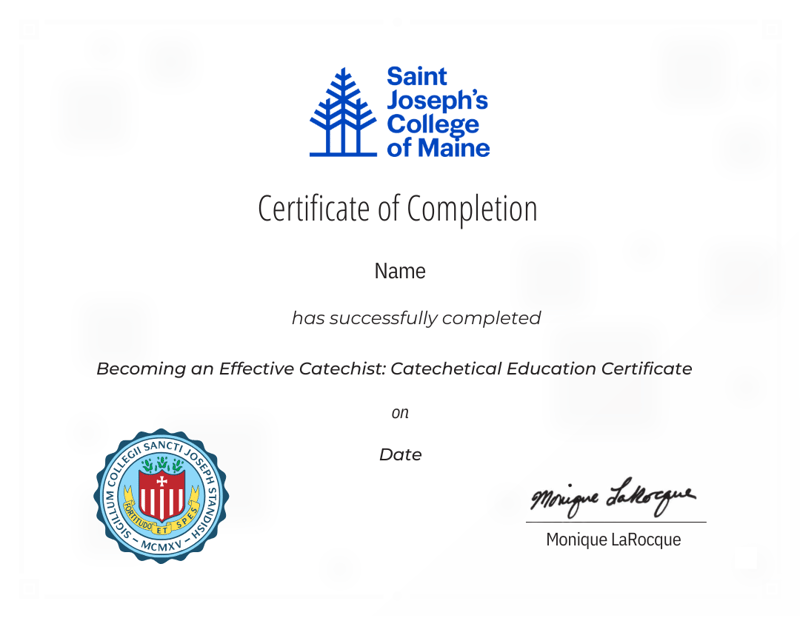The Adaptive Classroom
Course Enrollment
Who is This Program For?
This program is for Catholic school administrators, principals, and aspiring administrations that are ready to take the next step in their education, and gain the knowledge and skills necessary to implement special education programming within their schools, regardless of resources. Though many Catholic schools have historically admitted students with special needs, many have struggled to be able to assist students with substantial learning disabilities and many have had to turn special learners away as a result of a lack of resources and adequately trained special education teachers and programs. However, the Church calls on us to educate all children, not just those who are neuro-typical; inclusion is necessary and important to the faith. Church history is filled with doctrine and mandates that call on us to educate all children. This credential educates the school administrator in ways that help to accomplish this mission through strategies and models in teacher education and pedagogy, community engagement, leveraging limited resources, and utilizing data to build strong special education programming that will meet the needs of all learners.

Representative Job Titles
-
Principals
-
Assistant Principals
-
Diocesan Director of Inclusive Programs or General Academic Programs
-
Director of Curriculum & Instruction
-
Director or Coordinator of Academic Inclusion
Why do Administrators need to support educators who teach students with disabilities?
Importance of Leading and Supporting a Special Education Environment
Course Overview
One problem in the education industry is that there are children in every school with learning disabilities, but not every school is equipped to meet the needs of all learners. This certificate addresses the gaps that exist by teaching skills that administrators and teachers must have to foster the success of exceptional learner programs.
This credential will equip learners with the following skills and work competencies:
- Data selection and analysis to develop an exceptional learner framework, including:
- Admissions
- Standardized test scores
- Transition
- Milestone expectations
- Making mission-driven decisions for personnel recruitment, retention, and support
- Building a community aligned with the mission of the school
- Funding and marketing exceptional learner programs
- Implementing strategic alignment with existing programs and continuously improving
- Leveraging resources to build educator capacity to serve all students
Module 1: Understanding Catholic Mission: Serving All Students in the School Community. The United States Conference of Catholic Bishops (USCCB) began the conversation about persons with disabilities in 1978, and many schools are still trying to find ways to bring the intentions of the bishops to fruition. Why is the inclusion of persons with disabilities related to mission? How is inclusion beneficial to every community? How can the message of inclusion as part of the mission be communicated to the community as a whole? These questions will be answered in this module.
Module 2: Getting to Know and Educating ALL Learners in Your School. This module administrators will learn the most prevalent learning disabilities, their characteristics, how they present in the classroom, and national statistics and data on each. Federal funding models and terms will be presented and defined. Catholic Social Teaching as described by the US Conference of Catholic Bishops will be presented. Alignments with inclusion, disability rights and advocacy, as well as school mission will be explored.
Module 3: The Framework: Self-Assessment and Laying the Foundation. Administrators will learn the structures and attributes of a basic framework that serves all students within their school community. This module will help to strengthen functioning and practical aspects of the framework and provide an overview of various models used to include all learners.
Module 4: The Administrator’s Role in Inclusion. The administrator’s role is to communicate expectations for inclusion of exceptional learners and how the school community responds to the needs of all students. This module includes the necessary components for exceptional learner programs along a continuum of learner needs.
Module 5: Recruiting and Retaining Effective Inclusive Educators. Administrators must hire educators who believe in the mission of inclusion and are willing to use high leverage practices in the classroom. Focusing on instruction, assessment, social and emotional learning, and collaboration with colleagues yields elevated expectations for learners. Educators who are supported, trained to implement high leverage practices, and provided with coaching will remain in the school community, and increase retention of faculty.
Module 6: Barriers and Challenges (Expected and Unexpected). The best approach when implementing a program for inclusion is to prepare for the challenges that will most certainly occur. These challenges will come from the community, school board, educators, and diocesan leadership. Scenarios presenting challenges and barriers will be provided, along with potential solutions and methods for moving in a positive direction.
Module 7: Creating and Communicating a Place of Belonging. Welcoming is only the first step in creating an inclusive school environment. Ensuring that students feel a sense of belonging takes intention and effort. In this module, administrators will focus on the admissions processes, marketing/communications, community building, and dispositions of those within the community.
Module 8: Goal-Driven Implementation Planning for Sustainability. How do teacher goals and classroom expectations intersect with long-term strategic planning and accreditation goals? Integrated goal setting at various levels of a school will bring about success in implementation and sustainability of school-wide initiatives. In this module, administrators will focus on high level strategic school goals for academic inclusive programming using classroom and teacher level goals as building blocks.
Subject Matter Experts
Colleen McCoy-Cejka, M.A. is the co-founder of Inclusion Solutions, LLC and Ed-21 Solutions, companies dedicated to school improvement at every level. Building upon a professional career as an educator, principal, assistant superintendent, curriculum director, and leader of professional learning at NCEA, Colleen connects educators and leaders with the resources and information they need to succeed. Colleen was the driving force of inclusive practices within the Diocese of Phoenix. She hopes to share and build upon the practices initiated in Phoenix with school leaders committed to widening the circle. She is a founding board member of The Matthew 19:14 Project and a board member for the National Catholic Partnership on Disability.
Crystal Brooks, M.A., CCC-SLP, is the co-founder of Inclusion Solutions, a company dedicated to furthering the implementation of inclusive practices. Building upon a professional career as a practitioner, educator, state agency specialist, local and national presenter, and Catholic school leadership team member, Crystal empowers school leaders and educators to reach the goal of an inclusive educational community where all students are welcome.
Still Have Questions?
This is an eight-week program that will require about 5 to 6 hours of dedicated time per week.
No. Micro-credentials are not transferrable for credit. These are skills-based training programs that differ from a traditional college course.
No, there are no assignment deadlines. There is, however, a prescribed pace for timely completion as learners will have a set number of weeks to complete the credential.
Micro-credentials are self-paced and do not require the learner to attend class at a certain time each week. Learners should expect to spend 5-6 hours per week engaging with the course at their own pace. Select weeks will have optional webinars featuring industry experts.
Students will receive a certificate of completion.

Please feel free to use any of these options to reach out to us. We would love to hear from you!
- Call us at: 508-925-4762
- Email us at: SJCadmissions@focusedusolutions.com
- Fill out the form at the bottom of this page
- Use the chat to connect with one of our counselors
Want to learn more?
.png?width=200&height=102&name=SJC_Logo_Stack_rev%20(1).png)
.png?width=400&height=131&name=New%20LOGO1%20(002).png)